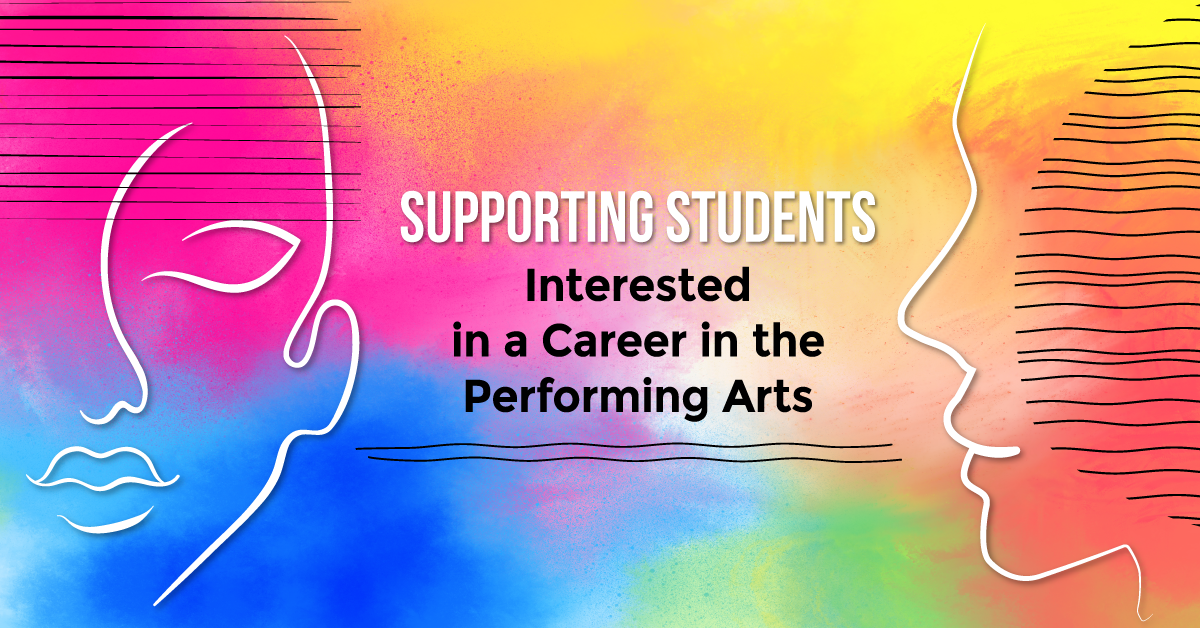Supporting Students Interested in a Career in the Performing Arts
It’s gratifying when a student lets you know that they are interested in pursuing a career in the performing arts. You have clearly made an impact on them, and they’re looking for assistance in taking the next steps. Here are some tips for teachers to help support their students as they begin their journey toward a performing arts career.
1. What career areas are they interested in pursuing?
Most students interested in a career in the performing arts will default to acting, writing, or directing. A few will pursue technical theatre or stage management. However, there are so many different, interesting venues to pursue in the performing arts world beyond just acting.
Introduce your students to some different vocations within the performing arts that they may not know about, such as fight direction, historical consultation, intimacy coordination, special effects creation, arts administration, casting, arts law, drama therapy, and so on. If possible, arrange for someone in these careers to be a guest speaker.
2. How are they going to get there?
There are many different directions a student can take after high school. If a student feels called towards a post-secondary education, they’ll need to consider which type of school they’ll attend. College? University? Theatre school? A specialized training course? Will they get a diploma or a degree, and if so, what kind of degree? (A Bachelor of Arts? A Bachelor of Fine Arts? A Bachelor of Education, if they want to teach? What is the difference between all those degrees?) Do they want to get a co-op placement or an apprenticeship? Would they rather go out and start auditioning and/or working right away? Are they interested in striking out on their own and creating their own theatrical company?
If you have the space, start a resource area with brochures and information about various training programs. If space is an issue, create a shareable document with links to different websites for schools, placements, and performing arts companies to help students learn about what’s out there.
3. ABL — Always Be Learning
No matter where students venture to after high school, learning never stops. Encourage students to read books and articles to keep current on the new trends in theatre, to take classes to keep learning new concepts and broadening their artistic horizons, and to try out new theatrical experiences, especially those in different areas than they normally focus on, or that challenge them in some way. Those new experiences can be nerve-wracking, but they are often the ones students learn the most from.
Along that line, challenge students to treat every theatrical experience as a learning opportunity. Whenever they complete a project, encourage them to reflect:
- What did you learn from this experience?
- How did you grow? (What skills did you learn/develop? What do you know now that you didn’t know before?)
- What memorable moments will stick with you?
These reflections will help students process their contributions to the final product, and encourage them to look at all their experiences objectively. Reflections work for both positive and negative experiences. Even if the show was the worst, most negative show experience ever, students will hopefully learn what NOT to do and how not to treat people in a similar situation in the future.
4. Heed this advice: always play nice!
No matter how talented, connected, or experienced someone is, if they’re a jerk, people will not want to work with them. Nobody has time for divas. The golden rule applies in the theatrical world — treat others the way you wish to be treated. Remind students that they never know where their next job may come from, and that their reputation will precede them. Don’t let other people treat you badly, but lead by example and treat everyone with kindness and respect.



